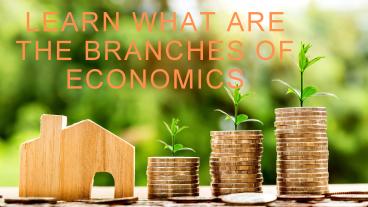Learn What Are The Branches Of Economics - PowerPoint PPT Presentation
Title:
Learn What Are The Branches Of Economics
Description:
Call Tutors is a one stop destination for all students who are looking for expert help in their Homework & Assignments, Programming, research papers, Business Plan & Presentations & more. – PowerPoint PPT presentation
Number of Views:207
Title: Learn What Are The Branches Of Economics
1
LEARN WHAT ARE THE BRANCHES OF ECONOMICS
2
Introduction
The most punctual record added in economics
scholars was the 8th century B.C. Greek
farmer/artist Hesiod, who formed that work,
supplies, and time should have been allotted
productively to conquer poverty. But The
organizing of modern Western economic matters
happened later and is largely credited to the
publisher of Scottish scholar Adam Smith's 1776
book.The guideline (and issue) of economic
aspects Which people have limitless wants and
holds a universe of constrained systems.Although
this view, economic aspects have been
deprecatorily known as the dismal science. A term
Inventor by Scottish student of history Thomas
Carlyle in 1849.
www.calltutors.com
3
What is Economics
Economics may be known in a few several ways.
Mainly this is the study of poverty, learning of
how people utilize resources and respond to
incentives, or the decision making study. It
regularly includes subjects like finance and
wealth, but not all about money. Economics is a
wide system that helps us to know historical
trends, make predictions about the new year or,
understand todays headlines.Economics aspects
range from the extremely little to the
exceptionally huge. The knowledge of individual
Choice is called microeconomics. And The
knowledge of the economy as a whole is called
macroeconomics. The macroeconomist might
concentrate on sovereign debt. As like
microeconomist might concentrate on families
medical debt.
www.calltutors.com
4
Branches of economics
Here in this part we will discuss some branches
of economics. Basically economics is divided into
two major parts (i) Microeconomics (ii)
Macroeconomics and in this we will tell you the
sub parts of microeconomics and macroeconomics in
an efficient way.
www.calltutors.com
5
- Classical economics
- This branch of economics considers the foundation
of modern economics. this branch is founded by
David Ricardo, Adam Smith. This is based on. - The activity of free markets. How the
undetectable hand and market instrument can
empower an effective portion of assets. - The economics work most productively when
government intercession is insignificant and
worried about the security of private property,
the advancement of international commerce, and
restricted government spending. - Labor economics
- The main person is Knut Wicksell who leads this
branch. Focusing on wages, labor markets and
labor employment. labor economics relates and
starts from neo economics premise. Recently there
are some changes made in this labor economics
that affect non monetary factors.
www.calltutors.com
6
- Neoclassical economics
- Neoclassical economics was founded by Willian
Jevons, Leon Walrus, John Hicks, and George
Stigler. This branch is built on the foundation
of the free-market related to classical
economics. Some ideas include. - Rational choice theory
- Marginal analysis
- Utility maximization.
- Environmental economics/welfare economics
- This branch was generated by E.F Schumacher,
Arthur Pigou, Garrett Hardin. this gives
importance to the environment and includes. - Market Failure Public goods, external benefits,
common tragedy, external cost. - Neoclassical analysis of external benefits and
external coast.
www.calltutors.com
7
- Keynesian economics
- The creation of this branch is by John Maynard
Keynes, Paul Samuelson. Keynesian financial
aspects were created during the 1930s against a
background of the Great Depression. The current
monetary conventionality was at a misfortune to
clarify the tenacious financial downturn and mass
joblessness. Keynes proposed that business
sectors neglected to clear for some reasons (for
example mystery of frugality, negative
multiplier, low certainty). - Development economics
- It includes or concerned with the issues of
underdevelopment in poorer and poverty issues in
countries. main peoples are Simon Kuznets and
Amartya Sen and W. Arthur Lewis who created this
branch. this branch relates to both Micro and
Macro Economics. Some issues involve. - Third world debt
- Increasing capital investment
- Trade vs aid
www.calltutors.com
8
- Econometrics
- Key people Jan TinbergenUtilization of
information to discover basic connections.
Econometrics utilizes measurable techniques,
relapse models, and information to predict the
result of economic approaches. For instance,
Okun's law recommends a connection between
economic development and unemployment. - Behavioral economics
- Key people Gary Becker, Amos Tversky, Daniel
Kahneman, Richard Thaler, Robert J. Shiller,This
branch of economics examines the science behind
economic decision making and activity. It
examines the limitations of the opinion of
individuals and is perfectly rational. The main
members are Amos Tversky, Gray Becker, Daniel
Kahneman, Richard Thaler. Some factors include. - Irrational Vitality- a person gets out of asset
bubbles. - Bounded Rationality- Individuals have choices by
thumb rule
www.calltutors.com
9
Here in this presentation our experts will tell
you about the economics and the branches of
economics for the students in an efficient way.
Our experts also provide Economics Homework Help
for beginners who want the homework help or
economics assignment help they will contact to
our experts they will help you and make you
satisfied.
10
CONTACT US
PHONE NUMBER 1 863 (867)-1512 WEBSITE WWW.CALLTU
TORS.COM E-MAIL ADDRESS INFO_at_CALLTUTORS.COM
Be the first to comment on this presentation.











![[DOWNLOAD]PDF The Economics of Inflation - A Study of Currency Depreciation in Post War PowerPoint PPT Presentation](https://s3.amazonaws.com/images.powershow.com/10087131.th0.jpg?_=20240727028)



















